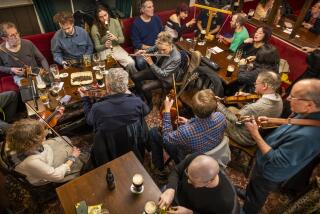Hunting for Pubs in England’s Horse Country
- Share via
The road rambled north of the lake called Rutland Water and, after a gentle rise, dipped into the village of Exton, a candidate, if ever I’ve seen one, for the sobriquet: “Prettiest Village in England.”
Cottages of honey-colored limestone--the pale golden hue that drives tourists to the Cotswolds--flanked the town common, which was aptly posted: The Green.
Thatched roofs jutted over dormer windows like eyebrows raised in surprise. Clumps of iris and bluebells sprouted beneath oaks and beech trees.
An enormous van, perforated with vents, was parked nearby. Racing Pigeon Transporter was painted on its side. I thought of Andy Capp’s cooing birds, and the newspaper story I had just read in which one of Queen Elizabeth’s royal flock had won a 5 purse at her country estate in Sandringham.
On the far side of The Green, behind ivied walls, was a pub: the Fox and Hounds. I pushed into a small room that smelled of wood smoke and tobacco and ale. From a knot of talkers, a white-haired man doffed his cap and pointed to a second door.
“The lav’s through there,” he said. Or so I thought. I was not looking for a lavatory, and hoped that my expression did not seem desperate.
Still, it was his pub and so I went through the door and found a larger and less smoky room. Sturdy wooden tables and benches with tie-on cushions lined the walls. Sunlight beamed through paned windows onto a stains-will-never-show carpet of brown and blue and yellow. Men and women were sipping cold lager near a hearth that was banked with daisies.
This was the lounge, not the lav--the sit-down side of the pub and, by tradition, the more genteel. It was a perfect place to relax on a breezy Sunday in the fabled hunt country, northwest of London.
The Fox and Hounds has overnight accommodations, which would have been tempting except that I had already unpacked at the gracious estate of Hambleton Hall on the shores of Rutland Water. The Fox and Hounds went on my next-time list.
English country inns--with their hearty food and chatty proprietors and olde sometimes spelled with an “e”--are an institution to savor, a traveler’s way of life-before-hot-tubs that the glossiest motel will never know.
In the market town of Stamford, east of Exton, I wandered into the King’s Head, hard by a graveyard. It was a small pub and somewhat frayed. The radio volume was high. Hundreds of old coins had been pressed into wax on the dark beams above the bar. Anells Best Bitter was on tap. There was no publican in sight.
“What’ll it be?” a man finally called. “I’ll apologize in advance for the service. I’m just a regular--a guest like you. But the pub keeper is a friend of mine and he had to go down the street for a minute. Somebody’s got to step in, right? . . . . Oops.”
The foam on the lager ran down the glass and he wiped it off with a rag.
I ordered the Ploughman’s lunch--crusty bread, slabs of cheese, relish, mustard and, at the King’s Head, spicy Lincolnshire sausage.
When I left, the pub keeper still had not returned, but his pal was carrying on and had even figured out how to work the cash register.
It was a far cry from the most sumptuous of Stamford inns: the George on St. Martin’s, where 46 rooms are tucked inside a 17th-Century hostelry with walled gardens. I marked it for next time, too, right there with The Fox and Hounds.
In the heart of Stamford, where cobbled roads meet, an old pub sign promised: “Good Stabling and Loose Boxes.” The girl behind the bar shrugged when I asked its meaning. “Anyone know about the sign?” she called.
“Hmmm,” nodded a codger. “This was once a coaching inn, you know. They had a stable for travelers’ horses as well as empty stalls . . . or loose boxes.”
“Well, I learned something,” said the girl at the bar.
Nearby was a half-timbered pub named the Marsh Harrier, which led to another query. Someone said it’s a dog that resembles a small foxhound and is used for hunting rabbits. Someone else said it’s a hawk.
Horses and fox hunting are traditional themes in this part of England. Hunt clubs rule in season, which is September through March.
In the prosperous and beguiling town of Oakham, fashionable country-wear shops pose next to saddle-and-tack merchants and feed stores. On Market Place is a 12th-Century building called Oakham Castle, where centuries of ceremonial horseshoes are displayed. The Rutland County Museum, housed in an 18th-Century riding school--and closed for Bank Holiday when I went by--is reported to have splendid exhibits of carriages and blacksmith’s tools.
A favorite Oakham pub and inn is the Whipper-In, and, yes, it’s OK to ask. “Naturally, the whipper-in is the one who works with the hunter and whips in the hounds,” a gentleman explained.
Naturally.
More to Read
Sign up for The Wild
We’ll help you find the best places to hike, bike and run, as well as the perfect silent spots for meditation and yoga.
You may occasionally receive promotional content from the Los Angeles Times.





